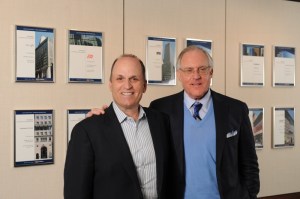 The Commercial Observer: Tell me about how business is going since the acquisition.
The Commercial Observer: Tell me about how business is going since the acquisition.
Mr. Jaccom: Well, we just finished at the end of the year probably one of the biggest deals since ESG Insignia did their thing. It’s been a fantastic deal. They’ve been great partners. I mean, they’ve been partners in the sense that they’re with you in good and bad times, which is great. They’ve done everything they said they were going to do. If it wasn’t FirstService, yes, it probably would’ve been somebody else. We were negotiating with two or three at the time. The reason we got turned on to them is because we were able to retain ownership. They buy what I call management.
Mr. Freedman: One of the most compelling reasons we did the deal is, as an independent regional firm, we were looking at having to make a massive infrastructural spend to be competitive in the marketplace against top bracket firms, and we realized that we needed a strategic partner with capital. The model is the Peter Drucker model. It’s a reverse merger; they’re buying the management of these firms, but then they’re aligning our interest with theirs, with us retaining a 35 percent interest in the company. Without alignment of interests, we’re employees, and we think like employees. We’re partners now, and that’s how we think. Our balls are on the line. At the end of the day, this business is in large measure about being pumped, and knowing you can compete, and now you’re not taking in batting practice with these guys—you’re in game conditions. And that’s how you build a championship team.
Did the financial collapse, which happened shortly after the deal was finalized, put a wrench in business plans?
Mr. Jaccom: This is an 85-year-old family business—and here we did this great deal and we have this great partner now and we’re all revved up and we have a whole plan laid out and then the brakes. When you needed dollars to do things, you went back to the family, and the family was always very accommodating—not that our new group isn’t accommodating, but it wasn’t a process. What we realized is that we had to cut our budget, clean the place up a little bit, make it lean and mean for the simple reason that nobody knew what was ahead of us. Nobody had a crystal ball.
We looked at ourselves and said, this gives us time internally to build our consulting group, to get more acclimated to the new group. There are so many different divisions, so many different companies. They own a project management company, an evaluation company, a hospitality company and a hotel division.
How exactly does one get acclimated to a new group on such a gigantic level?
Mr. Jaccom: Me and Bob did a road trip.
A road trip?
Mr. Jaccom: What we said was: We can get on the phone and we can introduce ourselves to people. The problem there is, there’s no chemistry. There’s no eye contact. So we felt like we needed to bounce around. So we went up to Boston and Seattle and Canada. We went up there and we matched certain senior people on our end with their end, and then we started letting them talk. We then went to San Francisco …
You guy’s didn’t actually drive, did you?
Mr. Jaccom: Nooo!
Mr. Freedman: But it should be noted that when we arrived in San Francisco, the bellman came to collect our bags and he said, ‘What room are you gentlemen in?’ And we said, ‘Now, I just want to go on record, we have separate rooms. We’re close but not that close.’



